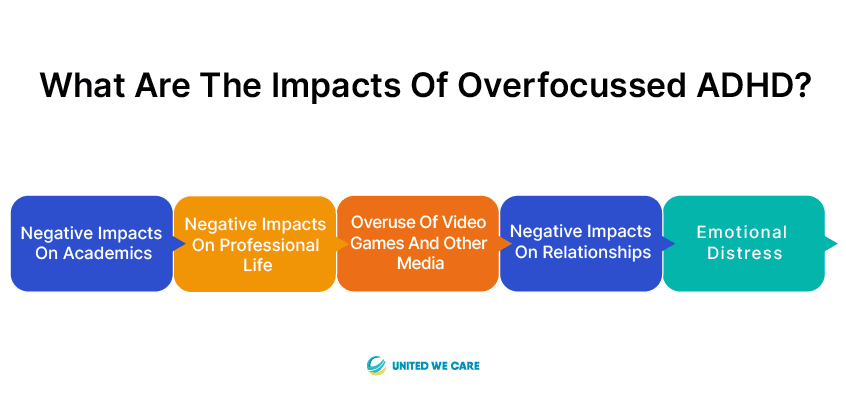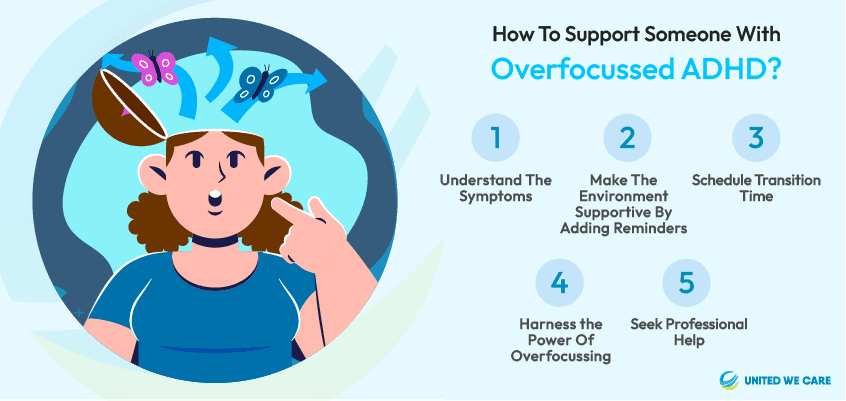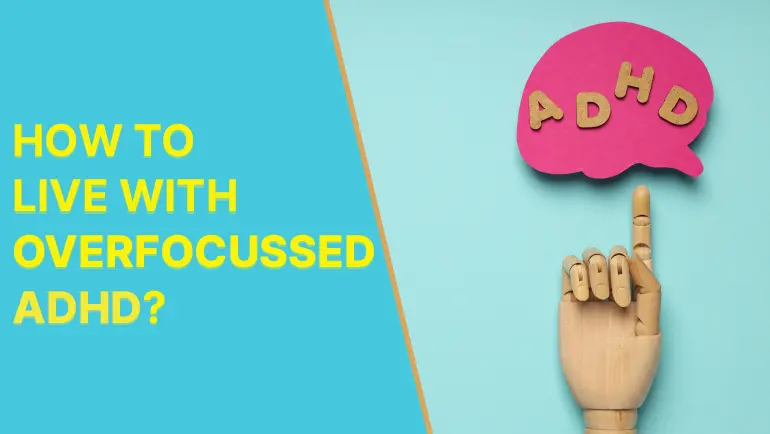Introduction
Attention-deficit/hyperactivity disorder (ADHD) is a developmental disorder which begins in childhood. The major issues that a person with ADHD faces are difficulties with attention, impulsivity, and hyperactivity. While most people associate distractibility and restlessness as typical symptoms of ADHD, there is one symptom and subtype that most people ignore: Overfocused ADHD. Individuals with overfocused ADHD struggle with excessive attention to detail and hyperfocus on specific tasks or thoughts. In this article, we will delve into the intricacies of overfocused ADHD.
What is Overfocussed ADHD?
Many individuals believe ADHD to be simply a deficit in attention and impulse control. But in reality, the disorder is much more than that. Speaking technically, ADHD is a disorder of a cognitive skill called Executive Functioning. EF or executive functioning is the part of the brain which is responsible for planning and organizing things as well as initiating or inhibiting actions [1]. Thus, individuals with ADHD have difficulty in EF tasks like monitoring their activities or regulating their attention.
One outcome of this inability to regulate is difficulty in shifting attention from one task to another. Thus, the person appears to be overfocusing or hyperfocusing on one task [1].
Overfocus ADHD is also called hyperfocus. The individual becomes so intently involved in a task that they cannot focus on any other thing in the environment [2]. Some have described this state as a “hypnotic spell” or getting “locked in” on a task, especially in cases when the task is of interest, interactive, and operative [3].
Once in a state of hyperfocus, individuals tend to neglect other things in the surroundings and keep fixated on the task for hours. Other characteristics of overfocused ADHD include inflexibility in cognition, inability to shift attention, obsessiveness, and worrying or protesting when attention is demanded elsewhere [4].
Even though the American Psychiatric Association does not formally recognize overfocus ADHD as a subtype of ADHD, and the symptom of hyperfocus does not feature in its diagnostic criteria [3] [4]. Nonetheless, this experience is both significant and prevalent in individuals with ADHD. Some researchers have argued for defining it as a separate dimension of adult ADHD [3].
What are the Symptoms of Overfocussed ADHD?
In overfocussed ADHD, the individual engages in an activity for a long time. During the engagement, many individuals experience a distorted sense of time; they do not realize how much time has passed or notice the world around them [3] [5].
Along with an intense focus on the task, other symptoms include [2] [4]:
- Trouble in shifting attention to other stimuli
- Inability to follow directions on time
- Getting stuck in the activity or thought
- Becoming obsessive and compulsive
- Becoming irritable or argumentative
- Difficulty adjusting to changing environment
Apart from these symptoms, there may be varying degrees of hyperactivity. These symptoms can cause significant negative impacts on the life of the person. Additionally, many times doctors misdiagnose people with overfocused ADHD and this leads to more problems than solutions.
Read more -ADHD Hyperfocus: Unleashing the true fact
What are the Impacts of Overfocussed ADHD?
Some suggest that overfocus can be positive and enhance creativity [3]. However, the symptoms of overfocussed ADHD can make it challenging to succeed in tasks requiring a person to be mentally flexible, such as school or work [4]. Some areas which can get impacted due to overfocussed ADHD include:

Negative Impacts on Academics
Since academics require a person to frequently shift their focus between subjects and topics, individuals with overfocus ADHD struggle in schools. Researchers have found this struggle to be a reality in many studies [3].
Negative Impacts on Professional Life
Prioritizing and time management are two skills which overfocussed ADHD impairs but almost all professional settings require. An inability to prioritize or manage time can result in missed deadlines, incomplete projects, and a sense of overwhelm for the ADHD sufferer and cause harm to their professional life.
Overuse of Video Games and Other Media
Studies have shown that certain situations trigger hyperfocus. These situations are typically the ones which the person finds internally rewarding and enjoyable, such as video games or social media [5] [6]. Thus individuals with this type of ADHD may overuse media avenues which invariably will have negative consequences for them [5].
Negative Impacts on Relationships
The intense concentration and hyperfocus can also strain personal relationships. Individuals tend to become so engrossed in their thoughts or tasks that they disregard social interactions or even fail to follow their social obligations, such as showing up for a planned date [2].
Emotional Distress
Overfocussed ADHD often comes with repetitive thinking patterns and when hyperfocus is broken it can lead to anxiety and emotional distress levels. Further, when the situation does not go as planned or expected for a person with ADHD it causes emotional unrest [2]. Overall, distress can increase with this type of ADHD.
More information- Hyperfixation vs Hyperfocus: ADHD, Autism, and Mental Illness
How to Support Someone With Overfocussed ADHD?
When supporting individuals with overfocused attention deficit/hyperactivity disorder (ADHD), empathy towards their unique challenges is important. Here are some strategies for supporting someone with overfocussed ADHD:

Understand the Symptoms
It is essential to understand how overfocussed ADHD manifests in each individual. One can control it better by figuring out what one usually hyperfocuses on [7]. Sometimes, like at nighttime or before an important meeting, avoiding activities that can trigger hyperfocus is best.
Make the Environment Supportive by Adding Reminders
Offering external reminders and tools to assist with time management and task prioritization can be highly beneficial to a person with overfocussed ADHD [2] [7] [8]. This could include visual cues, alarms, digital organizers, or trusted individuals in the environment who can help track how much time has passed, when to move on, and what to prioritize in a day.
Schedule Transition Time
It is difficult for the individual to get out of their hyperfocus state, and they often experience emotional distress or irritation. Developing a transitioning schedule that is rewarding, gentle, and does not push the person can be useful [9]. This can be created in collaboration with the person or child, for they usually are the best judge of what helps them the most [2].
Harness the Power of Overfocussing
Individuals with ADHD get overfocussed on things they find rewarding. So if one can increase the reward component in academic or professional settings one would be able to trigger the hyperfocus state for their benefit. [8]. Thus, harnessing the power of overfocusing can lead to an increase in the success of the individual.
Seek Professional Help
Psychologists or therapists specializing in ADHD can be of tremendous help because they can provide strategies and interventions tailored to the unique needs of the person with overfocused ADHD. The professional may be able to utilize techniques such as CBT, and skills training to enhance the control a person has on their ADHD.
Conclusion
Overfocussed ADHD can present unique challenges that require specific interventions. By adopting an approach which combines education, therapy, and practical strategies, individuals with overfocussed ADHD can gain better control over their lives.
If you are struggling with overfocused ADHD, contact the experts at United We Care. At United We Care, our team ensures you receive the finest solutions for your overall well-being.
References
- C. Huang, “A snapshot into ADHD: The impact of hyperfixations and Hyperfocus from adolescence to adulthood,” Journal of Student Research, vol. 11, no. 3, 2022. doi:10.47611/jsrhs.v11i3.2987
- C. Raypole, “Overfocused add: Symptoms, treatments, and more,” Healthline, https://www.healthline.com/health/adhd/overfocused-add (accessed Jun. 7, 2023).
- E. T. Ozel-Kizil et al., “Hyperfocusing as a dimension of adult attention deficit hyperactivity disorder,” Research in Developmental Disabilities, vol. 59, pp. 351–358, 2016. doi:10.1016/j.ridd.2016.09.016
- “What is overfocused add?,” What is Overfocused ADD? Overfocused ADD Symptoms & Treatment | Drake Institute, https://www.drakeinstitute.com/what-is-overfocused-add (accessed Jun. 7, 2023).
- K. E. Hupfeld, T. R. Abagis, and P. Shah, “Living ‘in the zone’: Hyperfocus in adult ADHD,” ADHD Attention Deficit and Hyperactivity Disorders, vol. 11, no. 2, pp. 191–208, 2018. doi:10.1007/s12402-018-0272-y
- Y. Groen et al., “Testing the relation between ADHD and hyperfocus experiences,” Research in Developmental Disabilities, vol. 107, p. 103789, 2020. doi:10.1016/j.ridd.2020.103789
- “Hyperfocus: Definition, benefits, disadvantages, and tips for Control,” WebMD, https://www.webmd.com/add-adhd/hyperfocus-flow (accessed Jun. 7, 2023).
- R. Flippin, “Hyperfocus: The ADHD phenomenon of intense fixation,” ADDitude, https://www.additudemag.com/understanding-adhd-hyperfocus/ (accessed Jun. 7, 2023).
- M. L. Conner, “Attention Deficit Disorder In Children And Adults: Strategies For Experiential Educators.,” : Experiential Education: A Critical Resource for the 21st Century. Proceedings Manual of the Annual International Conference of the Association for Experiential Education, Nov. 1994.









